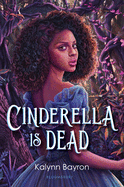
A fairy-tale legacy receives a creative dystopian twist in the YA fantasy Cinderella Is Dead, Kalynn Bayron's debut novel.
It has been 200 years since Cinderella attended that fateful ball, and her story can be found in every household in the kingdom. But the result is not fairy-tale charm: instead, the kingdom is a harsh oligarchy that imposes laws restricting women's rights in honor of "dutiful, faithful" Cinderella. Sixteen-year-old Sophia is outspoken and opinionated and seeks to make her own way in the world. Plus, she would "much rather find a princess than a prince." But freedom is elusive in a land where "the founding tenet of our laws is that women... are at the mercy of the fickle whims of men." At King Manford's mandatory annual ball (where suitors bid on young women for marriage), Sophia escapes into the forest, where she discovers Constance, a trained freedom fighter and a descendant of Cinderella's not-so-evil stepsisters. As Sophia's awe of Constance kindles into something stronger, they plot to take down the patriarchy, uncovering sinister secrets and shattering any preconceived notions of Cinderella's supposed happily ever after.
Cinderella Is Dead is a queer dystopian fantasy that questions written history and societal expectations. Through her idealism, Sophia understands the complexity of their situation, though not all of Bayron's inclusive cast of characters have the tenacity of her protagonist; some, fearing for their lives, deny their own identity in the hope of survival. Overarching themes of acceptance and equality give additional weight to a plot filled with dark magic and revolution as Sophia and Constance strive to write their own story in a world that tells them their very existence is wrong. --Jennifer Oleinik, freelance writer and editor

